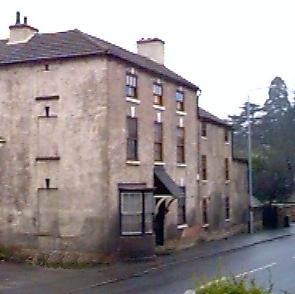Thomas Moore (1779-1852)
A Hyper-Concordance to the Poems of Thoms Moore

This is a photograph (taken by Kim Gayton-Pollard) of Thomas Moore's House In KEGWORTH.
It is now occupied by a man that sells historical and ancient musical instruments.
Thomas Moore Web Sites
Chronology
- 1779
- Thomas Moore born May 28 in Dublin, Ireland; the first child of John and Anastasia Codd Moore.
- 1784
- Attended private school run by T. J. Malone.
- 1786
- Attended English Grammar School; Samuel Whyte, headmaster of "the best school in Dublin."
- 1790
- First stage appearance, speaking epilogue to Jane Shore in private theatricals.
- 1793
- October, first appeared in print with verses in Anthologia Hibernica, Dublin magazine.
- 1794
- June, attended Dr. Carr's Latin School, preparatory to Trinity College, Dublin.
- 1795
- January, entered Trinity; tried for scholarship but as Roman Catholic was ineligible. Began translation of Anacreon. Robert Emmet and Edward Hudson were fellow students and friends.
- 1798
- May, rebellion of United Irishmen. Emmet, who had left college in April, was wounded but survived; Hudson was imprisoned and exiled; Wolfe Tone died in prison, allegedly a suicide; Lord Edward Fitzgerald died of wounds. Moore was questioned but refused to testify against his friends; permitted to remain in college.
- 1799
- March, received B.A. degree from Trinity. April to July, read law in Middle Temple, London; never admitted to bar. Worked on Anacreon. Returned to Dublin. (This was his first trip to England.)
- 1800
- Odes of Anacreon (London).
- 1801
- The Poetical Works of Thomas Little, Jr. (London).
- 1802
- July 27, The Gypsy Prince, opera, for which Moore wrote part of libretto, performed at Haymarket Theater, London.
- 1803
- Declined offer of Irish Laureateship, created for him. Robert Emmet hanged. Moore appointed registrar of admiralty prize-court, Bermuda; September, sailed for Norfolk, Virginia; arrived in November.
- 1804
- January 3, sailed for Bermuda. April, appointed deputy to take over duties; sailed for New York. Traveled in eastern United States and Canada. October, sailed for England.
- 1806
- Epistles, Odes, and Other Poems (London). Denounced by Francis Jeffrey in Edinburgh Review; challenged Jeffrey to duel, which was stopped by police; they were reconciled and became lifelong friends.
- 1808
- First and second volumes of Irish Melodies (London and Dublin); series continued to Volume 10 in 1834.
- 1811
- March 25, married Elizabeth (Bessy) Dyke, London. Lived in England thereafter.
- 1812
- February 4, daughter Barbara born. Moved to Kegworth, Leicestershire. Began contributing to Morning Chronicle.
- 1813
- March 16, daughter Anastasia born. Moved to Mayfield, Derbyshire. Intercepted Letters, or The Two-Penny Post-Bag (London).
- 1814
- Began contributing to Edinburgh Review. August 18, daughter Olivia born.
- 1815
- Spring, daughter Olivia died. Moore in Ireland until autumn.
- 1816
- First volume of Sacred Songs (London and Dublin); Volume 2 out in 1824.
- 1817
- Lalla Rookh (London). Visit to France. September 17, daughter Barbara died after a fall.
- 1818
- The Fudge Family in Paris ("by Thomas Brown the Younger") (London) . First volume of National Airs published ( London and Dublin ) ; series continued to Volume 6 in 1827. Moved to Sloperton Cottage, near Bowood, Wilt-shire, his home for the remainder of his life. October 24, son Thomas born.
- 1819
- Deputy in Bermuda absconded with �6000, for which Moore was responsible. To avoid arrest for debt, went to Continent. May, traveled in Switzerland and Italy; saw Byron for last time and was given manuscript of Byron's Memoirs. Family joined him in Paris at end of year. First collected volume, The Works of Thomas Moore (six volumes) published (Paris).
- 1822
- November, returned to England after compromise settlement of debt.
- 1823
- The Loves of the Angels and Fables for the Holy Alliance (by "Thomas Brown the Younger") (London). May 24, son Russell born. In Ireland with Lansdowne.
- 1824
- Memoirs of Captain Rock (London). Dispute over burning of Byron's memoirs.
- 1825
- Memoirs of the Life of the Right Honourable Richard Brinsley Sheridan (London). Visit to Sir Walter Scott in Edinburgh. December 17, father died; Moore in Ireland.
- 1826
- Evenings in Greece (London).
- 1827
- The Epicurean: A Tale (London).
- 1828
- Odes upon Cash, Corn, Catholics, and Other Matters (London).
- 1829
- March 18, daughter Anastasia died. Catholic Emancipation Bill passed.
- 1830
- Letters and Journals of Lord Byron, with Notices of His Life (London).
- 1831
- The Life and Death of Lord Fitzgerald (London).
- 1832
- May 18, mother died.
- 1833
- Travels of an Irish Gentleman in Search of a Religion (London).
- 1834
- December, sister Catherine (Kate) died.
- 1835
- First volume of History of Ireland (London) (Volume 4 [last], 1846). The Fudge Family in England (London). Granted Civil List pension, �300 a year. Triumphal visit to Ireland; elected to British Association for the Advancement of Science.
- 1838
- Last visit to Ireland.
- 1841
- The Poetical Works of Thomas Moore, Collected by Himself (ten volumes) (London), with autobiographical preface to each volume.
- 1842
- Received Order of Merit from Frederick the Great of Prussia. November 23, son Russell died.
- 1846
- February, Son Thomas and sister Ellen died. Moore's health failed from this time on
- 1849
- Moore lapsed into senile dementia.
- 1852
- February 25, Moore died.
* This is taken from MILLIAM ALLEN DEFORD, Thomas Moore (New York: Twayne Publishers, 1967).
Last updated: 23 January 2001.
If you know about any other Web sites related to the life and works of
Thomas Moore, please e-mail me at matsuoka at nagoya-u.jp.
 Top of Page
Top of Page
 Mitsuharu Matsuoka's Home Page
Mitsuharu Matsuoka's Home Page


 Top of Page
Top of Page
 Mitsuharu Matsuoka's Home Page
Mitsuharu Matsuoka's Home Page